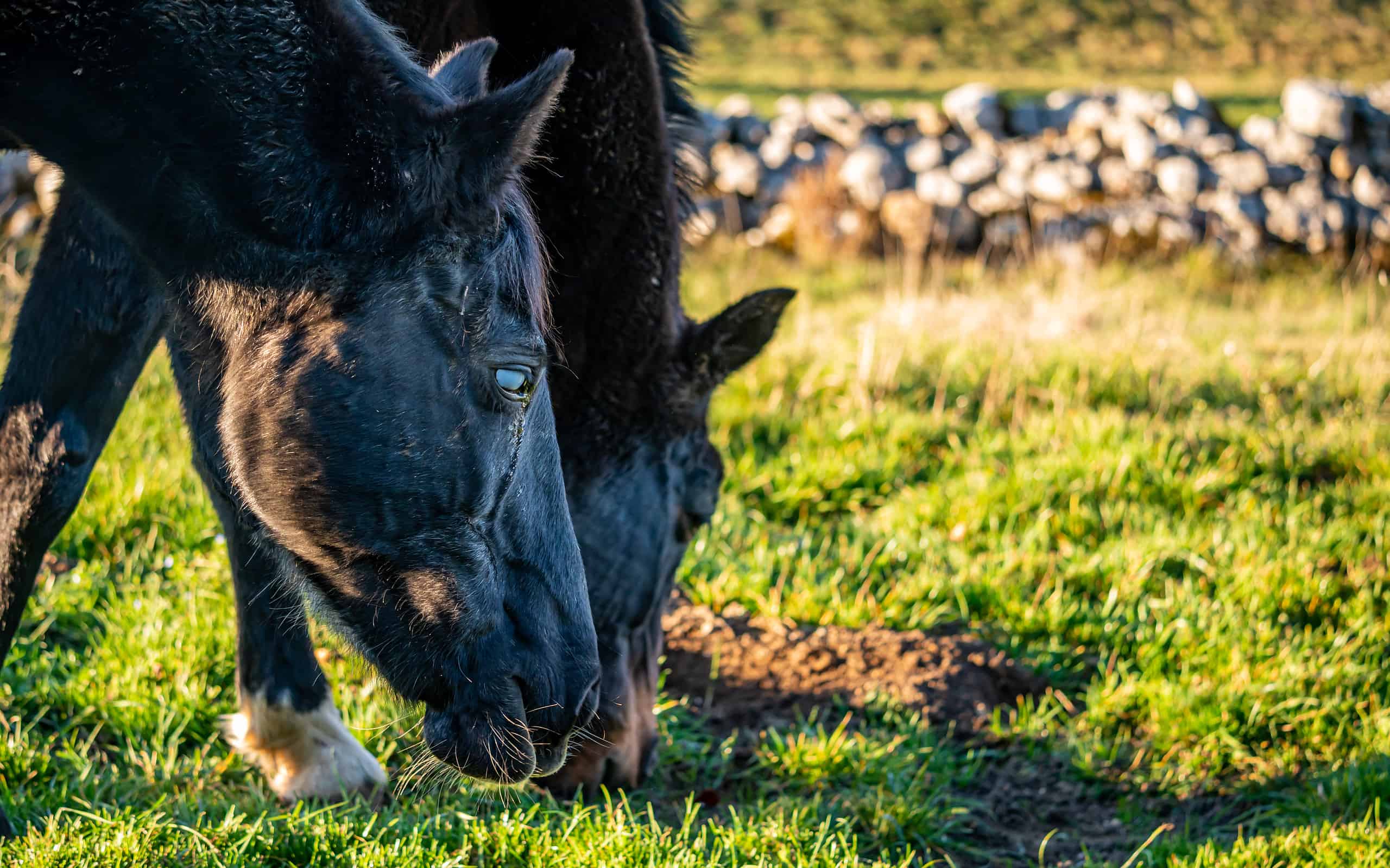Moon blindness may be the leading cause of vision loss in horses, but it’s a curious condition that still leaves experts stumped. However, loss of sight doesn’t mean loss of life! The low-grade, progressive inflammation associated with the disease can be managed with medicine or treated with surgery. Ready to discover more about the causes, symptoms, and diagnosis of moon blindness in horses? Let’s peel back the blindfold on this mysterious equine ailment.
Moon Blindness in Horses
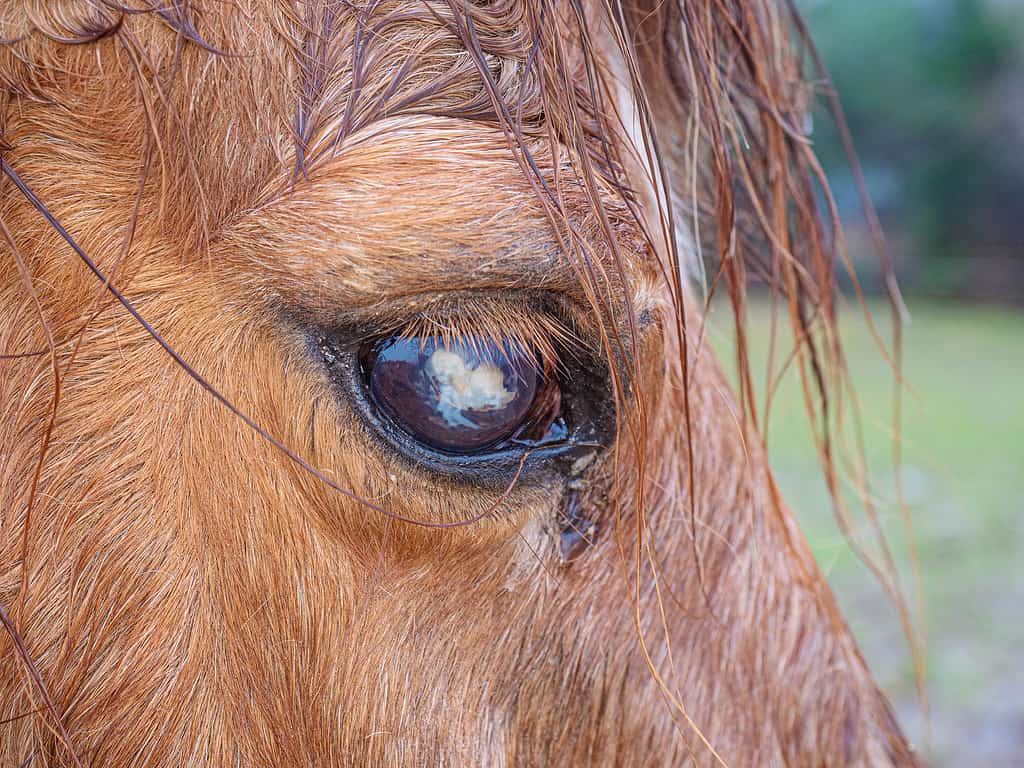
The chronic and sometimes painful eye disease in horses is called moon blindness.
©rdonar/iStock via Getty Images
Moon blindness — also known as periodic ophthalmia or equine recurrent uveitis (ERU) — is an autoimmune disease in which the horse’s immune system attacks its own eye tissues. It is the most common reason that horses lose their vision.
While blind horses can lead long, happy lives, it may affect their confidence, make training harder, or prevent you from competing (at the same level or at all). As of now, there is no known cure for ERU. So what causes this mysterious disease?
Causes of Equine Recurrent Uveitis in Horses
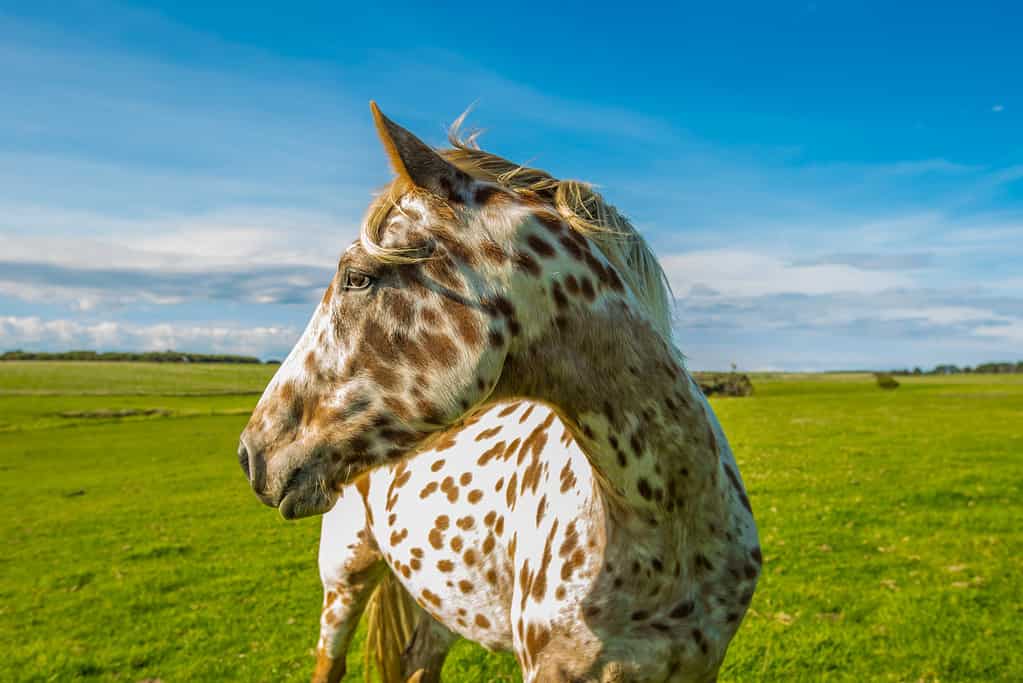
Thanks to genetic factors, Appaloosas are 8x more likely to develop moon blindness than other horse breeds.
©Anara55/iStock via Getty Images
Experts believe ERU is influenced by environmental and genetic factors. Exposure to an irritant or trauma to the eye are common causes but also certain breeds and horses in specific geographical locations are more susceptible. Let’s look more into the two main factors that lead to this complex disease.
Environmental Factors
One cause of moon blindness in horses is an infection. But it’s not that simple. Exposure to the bacteria or virus triggers the horse’s immune system to overreact, causing inflammation in the eye and beginning a damaging cycle.
The most common way horses catch this infection is through Leptospira-contaminated water. Research also shows that horses located in areas with tropical and temperate climates are more at risk. This is your reminder to clean out those water buckets and troughs!
Genetic Factors
But moon blindness in horses goes deeper than their environment. Certain breeds are more at risk for ERU based on their genes.
For example, Appaloosas are 8.3x more likely to develop uveitis and 4x more likely to go blind from ERU. Patterned breeds like Appaloosas, Pony of the Americas, and Knabstruppers have specific genetic markers — the leopard complex spotting allele (LP) and the modifier PATN1 — to thank for that.
But that’s not all. Icelandic horses have a higher likelihood as well. There’s a minor association between a genetic marker of this breed and an increased risk, but it’s still being studied. Even though experts don’t know everything about moon blindness in horses, veterinarians and owners alike can still diagnose it by looking out for a few telltale signs.
Symptoms of Moon Blindness in Horses
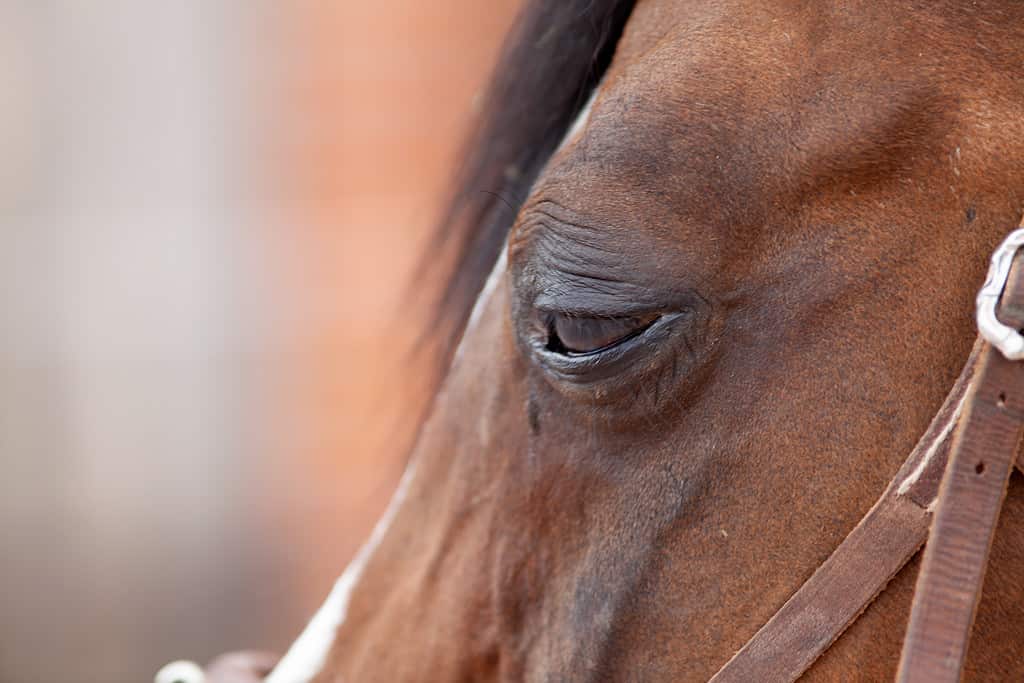
Swollen, tearing eyes are common symptoms of equine recurrent uveitis.
©anjajuli/iStock via Getty Images
It’s best to consult your veterinarian if you recognize that something is off with your horse. Sometimes ERU doesn’t present with obvious symptoms or the progression is gradual, so it’s important to pay attention to their behavior. Other times it is clear there’s something wrong.
In either case, call your vet as soon as you notice a problem. They have the proper medical training, schooling, and hands-on experience to diagnose (and treat) moon blindness. There are signs you can look out for though, so let’s discuss those.
Signs and Symptoms
Symptoms of moon blindness in horses include:
- Squinting
- Holding the affected eye shut
- Light sensitivity
- A smaller-than-normal pupil
- Excessive tears
- Bloodshot eyes
- A cloudy cornea
These concerning signs may point to inflammation caused by an overactive immune system that needs to be addressed. This is especially true if you have a leopard-patterned breed that’s predisposed to this chronic disease. However, there are shared symptoms that present with primary corneal disease, other uveitis cases, and ERU. Be sure to consult your vet for a proper diagnosis.
Treatments for Equine Recurrent Uveitis
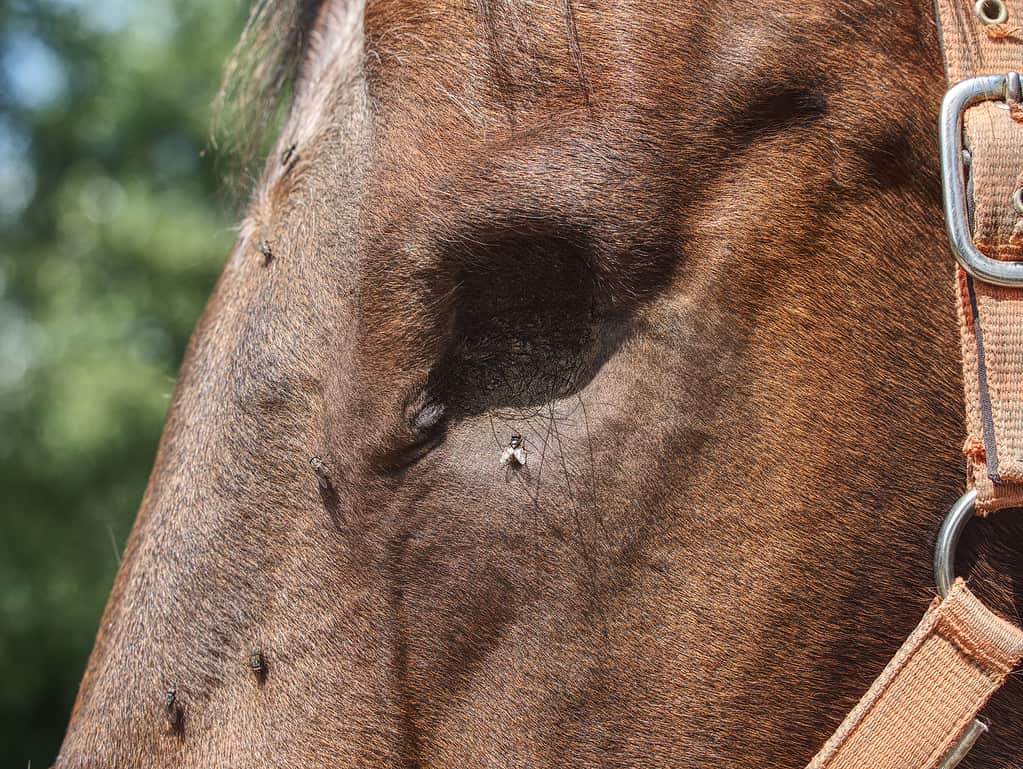
The last resort treatment option for moon blindness in horses is to remove the affected eye.
©rdonar/iStock via Getty Images
Once your horse receives an ERU diagnosis, that’s when treatment can begin. There are several options depending on the severity and disease variety — classic, insidious, or posterior.
Medication
Both topical and systemic anti-inflammatories like Banamine, steroids, and immunosuppressive drugs help treat moon blindness in horses. If your horse is in pain, medication is available to dilate the pupil and ease the pressure. If an infection is the cause of the episode then antibiotics are often prescribed.
The problem with medication is that horses don’t like taking it…. can you blame them?
If that happens, your vet can attach a subpalpebral lavage catheter from your horse’s mane to their eye. This makes it easier to administer the much-needed medications long-term.
Implant
Another long-term option is a cyclosporine A implant, which lasts for up to four years. This is a cost-effective option that’s also known to reduce the recurrence of uveitis. The only downside to this is that the implant can’t be placed until the ocular inflammation dies down.
Surgery
In specific cases, like for horses with posterior uveitis, there’s a procedure used to treat moon blindness. Your horse goes under anesthesia and your vet removes their vitreous humor — the fluid in the back of the eye. This eliminates the trigger that kicks their immune system into overdrive!
The last resort treatment for moon blindness in horses is to remove the affected eye. In extremely painful cases of ERU where flare-ups can’t be controlled with medication, this might be the best option. Especially when you consider the outcome of repeated episodes of inflammation caused by moon blindness.
Outcomes of Moon Blindness in Horses
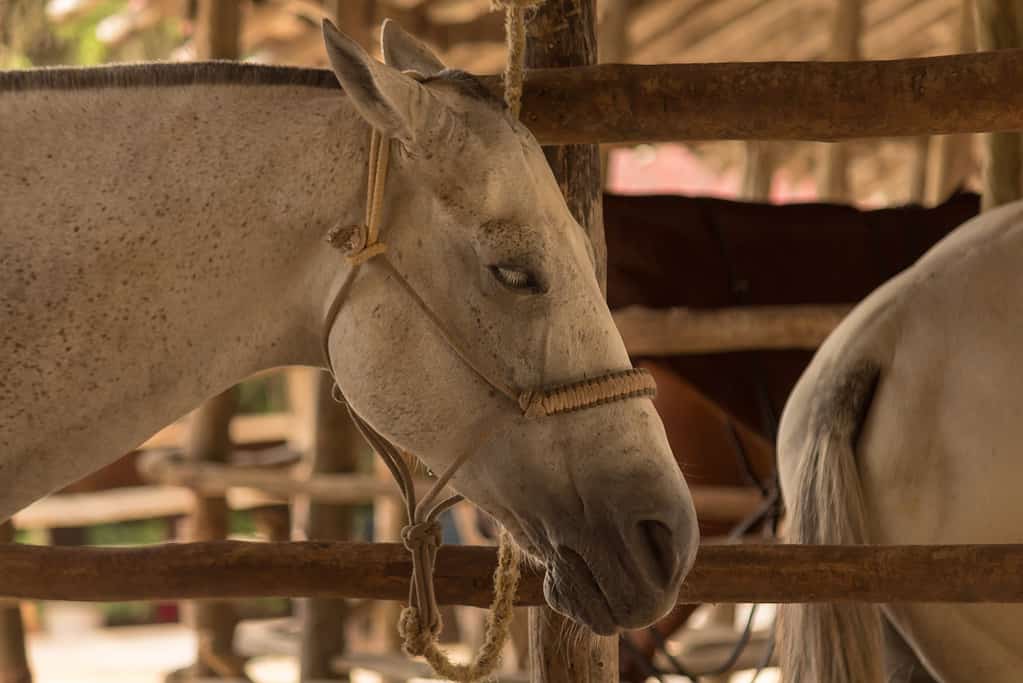
Even with treatment, ERU can progress to the point of causing total blindness.
©Maria Victoria Herrera/iStock via Getty Images
Every treatment’s objective is to manage the symptoms of your horse’s moon blindness as well as the disease’s progression. Your vet will do everything they can to decrease orbital swelling, control pain, and minimize damage to the structures of the affected eye with the ultimate goal of delaying loss of sight. They might even suggest that you cover your horse’s eye to prevent further injury or irritation.
However, damage does occur when it comes to moon blindness in horses. Some unfortunate outcomes in horses who develop ERU include:
- Chronic pain
- Scarring on the affected eye
- Cataracts
- Glaucoma
- Phthisis bulbi or shrunken eye
- Total blindness
There’s still hope though.
Can You Ride a Horse With Moon Blindness?
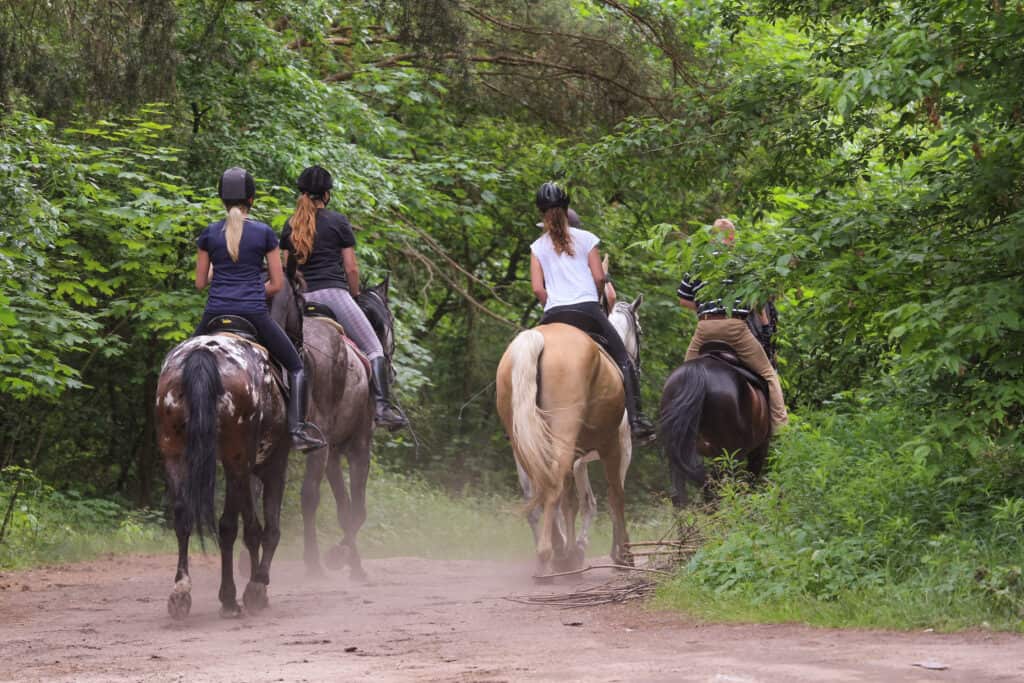
It’s still possible to ride a horse with moon blindness, but it depends on the severity of the disease and how well they recover.
©Canon_photographer/Shutterstock.com
We mentioned earlier that loss of sight doesn’t mean a loss of life! Blind horses have to navigate different challenges than seeing horses, but that doesn’t mean they can’t enjoy what they still have.
Depending on the severity and how well recovery goes for your horse, you could get back in the saddle rather quickly. If ERU left your horse blind, take training slowly and use trusted tools and resources to increase their confidence. Horses are resilient animals that are capable of adapting to many circumstances with a bit of hard work and a lot of TLC.
But what if they never quite recover? Consider adopting a companion animal like a horse, donkey, or goat to increase their quality of life. Your horse deserves the best and not even a complex, chronic disease like moon blindness should stop them from getting it.
Thank you for reading! Have some feedback for us? Contact the AZ Animals editorial team.

